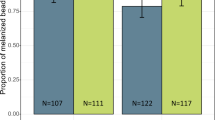Abstract
MANY insects are known to make use of surface energy effects to allow them to respire at the surface of the water. The outer walls of the respiratory trumpets of mosquito pupae are hydrophil. while the inner lining is hydrophuge1. When the pupae are at the surface the surface film is distorted upwards around the spiracles and the pupae are in a stable position2. The positive buoyancy of the pupae is counteracted by the attraction between the water molecules and the outer walls of the spiracles.
This is a preview of subscription content, access via your institution
Access options
Subscribe to this journal
Receive 51 print issues and online access
$199.00 per year
only $3.90 per issue
Buy this article
- Purchase on Springer Link
- Instant access to full article PDF
Prices may be subject to local taxes which are calculated during checkout
Similar content being viewed by others
References
Christophers, S. R., Aedes aegypti (L.) (Cambridge University Press, 1960).
Manzelli, M. A., Proc. N. J. Mosq. Ext. Assoc., 28, (1941).
Nachtigall, W., in The Physiology of Insects (edit. by Rockstein, M.) (Academic Press, New York, 1965).
Reid, J. A., Proc. Roy. Entomol. Soc., A, 38, 32 (1963).
Houlihan, D. F., thesis, Univ. Bristol (1969).
Author information
Authors and Affiliations
Rights and permissions
About this article
Cite this article
HOULIHAN, D. How Mosquito Pupae escape from the Surface. Nature 229, 489–490 (1971). https://doi.org/10.1038/229489a0
Received:
Issue Date:
DOI: https://doi.org/10.1038/229489a0
Comments
By submitting a comment you agree to abide by our Terms and Community Guidelines. If you find something abusive or that does not comply with our terms or guidelines please flag it as inappropriate.



